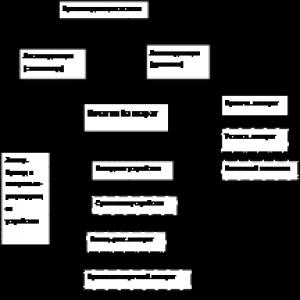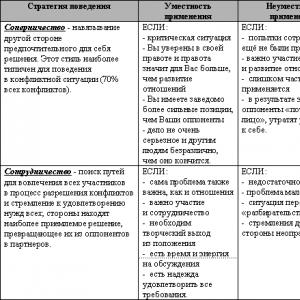Leave without pay with dismissal. How to get fired while on vacation
Vacation at own expense with subsequent dismissal assumes that the employee, after leaving the unpaid leave, will no longer continue to work. Consider under what circumstances you can go on unpaid leave, and how to quit immediately after it ends.
When can you go on unpaid leave?
The possibility of going on unpaid leave is provided for in Art. 128 of the Labor Code of the Russian Federation. This type of leave is granted at the request of the employee, and if there are grounds for it.
The grounds for granting unpaid leave to an employee include:
- Family circumstances in the life of an employee that the Labor Code of the Russian Federation does not specify.
- The presence of other good reasons, the exhaustive list of which is not defined by the Labor Code of the Russian Federation. The reasons can be any, and whether they are valid or not, the management decides.
The period of vacation is negotiated by the parties to the employment relationship separately, its minimum and maximum sizes can be different - from one day to infinity (upon reaching an agreement between the employee and the employer).
The procedure for granting unpaid leave to an employee is as follows:
- the employee applies for unpaid leave;
- the employer considers it;
- a decision is made and the head is affixed to his satisfaction or dissatisfaction.
Part 2 Art. 128 of the Labor Code of the Russian Federation provides for cases when an employer does not have the right to refuse an employee his right to go on unpaid leave. The law defines the minimum number of days that an employee can use, depending on the situation. For clarity, we present the grounds for the mandatory provision of unpaid leave and its minimum terms in the table.
| No. p.p. | Base | Maximum period of mandatory unpaid leave (in days) |
| 1 | Worker - participant of the Great Patriotic War | 35 every year |
| 2 | An employee is an old-age pensioner who continues to work | 14 every year |
| 3 | An employee is a parent, or a spouse of those killed in the line of duty by employees of the Ministry of Internal Affairs, customs, military, UFSIN bodies | 14 every year |
| 4 | The worker is disabled | 60 every year |
| 5 | An employee has a baby | 5 at a time |
| 6 | The employee is getting married | 5 at a time |
| 7 | A close relative of an employee has died. | 5 at a time |
Can an employee write an application for unpaid leave with subsequent dismissal?
Such a possibility is not directly established by law, and the Labor Code of the Russian Federation bypasses this issue. Art. 127 of the Labor Code of the Russian Federation allows going on vacation with subsequent dismissal only if the vacation is paid. At the same time, the legislation does not contain a ban on going on unpaid leave with dismissal at the end of it.
Since there is no ban, the final decision is made by the employer. If he allows the employee to quit immediately after unpaid leave, then there will be no problems.
In addition, you can quit of your own free will, guided by the general rules on the need to warn the employer about dismissal 2 weeks before the date of termination of the contract (part 1 of article 80 of the Labor Code of the Russian Federation). To do this, you can submit two applications at the same time - for granting leave at your own expense and for dismissal. The period of leave is counted in the period of notice. If the vacation at your own expense is more than 14 days, then after its expiration you can not go to work. If the vacation period is shorter, you will have to finalize the remnants of the two-week “working off” period.
Thus, the easiest way to quit immediately after the end of unpaid leave is to negotiate with the employer. The second way is to quit according to the general rules provided for.
Going on vacation with subsequent dismissal of one's own free will is the right of an employee, enshrined in the Labor Code. So that the labor inspectorate does not have any complaints, the personnel officer and accountant must follow the procedure in strict accordance with the requirements of the law.
Many people prefer to take the opportunity to take a break before looking for a new job instead of financial compensation for unused vacation days. However, leave with subsequent dismissal has a number of features. Let's look at these features, describe how to provide leave with subsequent dismissal, how to properly draw up documents. We will answer popular questions on this topic.
About leave with dismissal
He speaks of the possibility of taking a vacation with subsequent dismissal of his own free will. At the written request of the employee, unused vacations may be granted to him with subsequent dismissal.
The first important clause of the legal rule: the provision of rest is excluded if the employee is fired for guilty actions. Only a conscientious and disciplined employee can take the prescribed days before terminating the employment contract. The list of guilty actions, during which it is impossible to use vacation days in exchange for compensation, is in article 81 of the Labor Code of the Russian Federation.
The second important caveat: characterizing the employee’s right to leave with subsequent dismissal, Article 127 of the Labor Code of the Russian Federation uses the wording “leaves can be granted”, which means that the employer is not at all obliged to provide the employee with rest before terminating the contract. The head of the organization retains the right to refuse even a conscientious employee and pay compensation in return for unused days. Or provide for rest only part of the prescribed period, and compensate for the rest of the time financially. Clarifications on this matter were given by Rostrud in Letter No. 5277 6-1 dated December 24, 2007.
It turns out that an employee can take a chance to rest before looking for a new job only by mutual agreement with the management.
Two ways to go on vacation before leaving
The first option: the employee leaves to rest according to a pre-approved schedule, having written a statement of his own free will before this or already being on vacation. At the same time, he can take time off both pre-planned days according to the schedule, and those days that he did not have time to use before.
The second option: the employee writes an application for rest at the same time as an application for dismissal of his own free will. In this case, the established schedule can not be followed.
The date of termination of the employment contract under Article 127 of the Labor Code of the Russian Federation is considered in any case the last day of rest.
But the management can accept a new employee in the place of a resigning employee immediately, without waiting for the rest to end.
Application and order for leave with subsequent dismissal, registration procedure
The employee usually makes 2 statements:
- on leave with subsequent dismissal;
- dismissal with reasons.
And the management draws up 2 orders:
- on granting leave (based on the first application of the employee);
- on termination of the employment contract (based on the second application).
It is also allowed to draw up one application from the employee: you can write an application for leave with subsequent dismissal of your own free will - this does not contradict the norms Labor Code of the Russian Federation.
But when using a unified form of documents, the employer still issues two orders, because the form of a single order has not been officially established. Order forms that can be used are documents of the form T-6 (T-6a) and T-8 (T-8a), recorded in the Decree of the State Statistics Committee of 01/05/2004 No. 1. The original is attached to one of them as a basis, and to the second - a copy of the employee's application. Forms of orders must be approved by the company's management as accounting documents.
The second option for management is not to use unified forms, but to develop an order form on your own. Then you can issue both actions in one order. The main thing is that it contains the required details of the primary accounting document.
Application for leave with subsequent dismissal, sample 2020
The work book is handed over to the employee on the last day before the rest, despite the fact that he will be fired on the last day of his vacation.
Example: Dudnikova I.N. takes 28 days of rest from 04/17/2018 and quits. She receives the work book and the calculation in her hands on April 16 - the last working day before leaving. She will be officially dismissed on 05/16/2018 - on the last day of rest. Please note that two more days have been added to the main days for non-working holidays - May 1 and 9. Holidays are extended due to holidays. This period is counted in the seniority of I.N. Dudnikova, which is reflected in the order and work book.
Order for leave with subsequent dismissal, sample 2020
A sample of a self-developed order form based on the example application above. An order drawn up in a similar form is issued once.

Popular questions
Employees who plan to take a break before they leave are often worried about issues related to registration and payment. We will answer the most popular of them.
Can they get fired while on vacation?
Art. 81 of the Labor Code of the Russian Federation states that termination of an employment contract at the initiative of the employer during rest is not allowed. Except in cases of liquidation of the company or termination of the activities of the individual entrepreneur.
Can I quit my job while on vacation?
You can quit on your own initiative during the rest period. The main thing is to comply with the deadline for filing an application for termination of an employment contract (2 weeks). Moreover, by agreement with the authorities, a two-week period can be bypassed.
Is it possible to go on vacation with subsequent dismissal without working off
Often, employees believe that they cannot quit at this time, since they are required to work for two weeks before leaving, so they often ask the question: how to go on vacation with subsequent dismissal without working off. However, the Labor Code does not contain the concept of "working off 2 weeks before dismissal." Part 1 Art. 80 of the Labor Code of the Russian Federation states: "to warn the employer in writing at least 2 weeks in advance." It is quite possible to warn the authorities about the intention to quit, while being on vacation. You are not required to be present at the workplace for the next 2 weeks.
When will the money be paid
The employer is obliged to pay wages and vacation pay, as well as issue a work book and other documents to the employee before terminating the employment contract. There is some discrepancy in the dates of payment of vacation pay and wages in the final calculation. The money will be paid to you three days before going on vacation (Article 136 of the Labor Code of the Russian Federation). And the RFP and documents must be issued on the last day before leaving. These payments are not part of the salary. It turns out a small spread in the days of payment of vacation pay and wages, which is inconvenient for both employees and employers. But these are the calculation rules established by labor legislation (Article 136, Article 140 of the Labor Code of the Russian Federation). Failure to do so will result in a fine for the employer.
Do they withhold wages for unworked days
An employee is given 28 calendar days of rest as a general rule, regardless of whether he managed to work out the required year. But only those days are paid that would be subject to compensation upon termination of the contract. Therefore, yes, if an employee received full annual paid leave, but did not have time to work out the time allotted for it, they will withhold the appropriate amount upon dismissal from his RFP. These are the explanations of Rostrud in the Letter dated December 24, 2007 No. 5277-6-1. True, they can withhold no more than 20% of the amount ( Art. 138 Labor Code of the Russian Federation). And in some cases, holding is generally prohibited (more on this in Art. 137 of the Labor Code of the Russian Federation). The provision of an incomplete rest period (as many days as the employee managed to earn in the working year) is not provided for by the Labor Code of the Russian Federation, although it is possible by agreement of the parties.
To make it clearer, let's take an example.
Dudnikova I.N. wrote an application for leave for 28 calendar days with dismissal. And in the last working year, she worked only 10 months and 12 days (since 12 days is less than half a month, the period is rounded down. If the employee worked 10 months and 16 days, they would be counted as 11 months). For 10 months worked Dudnikova I.N. supposed to rest: 28 days / 12 days × 10 months. = 23.3 days. The funds at the final settlement were put to her only for 23.3 days, but paid for all 28 days.
It turns out that the employee did not manage to earn 28 - 23.3 = 4.7 days in the working year, but she received payment for them. If the vacation pay received in 28 days amounted to 10,000 rubles, then the following amount is to be deducted from Dudnikova's salary: 10,000 rubles. / 28 days × 4.7 days = 1678.57 rubles.
Consider the situation when the employee took the initiative to terminate the employment contract during his vacation, the employer is obliged immediately from the point of view of legal norms and regulations.
Dear readers! The article talks about typical ways to solve legal issues, but each case is individual. If you want to know how solve exactly your problem- contact a consultant:
APPLICATIONS AND CALLS ARE ACCEPTED 24/7 and 7 days a week.
It's fast and FOR FREE!
There are subtleties and nuances here that you should pay special attention to. This also applies to the preparation of an application by an employee, entries in a work book, as well as a painful monetary issue in relation to the so-called free vacation period.
In order to understand all this well, it is enough just to study the features of labor legislation regarding the termination of an employment agreement from vacation.
Procedure
In the event that a vacation worker himself wanted to terminate his employment relationship with the employer, he has the right to declare his desire.
Does not in any way restrict the employee in this position when he is on vacation. Only a subordinate must comply with the deadlines for submitting an application, and the head of the enterprise must remember what procedure exists for completing such a procedure.
Let's pay attention to the following important aspects:
In the first case, it happens, as it were, not from vacation, but after it ends. Moreover, it will be made automatically on the basis of an application that the employee, in agreement with the employer, wrote before going on vacation.
The application indicates the reason for going on vacation with subsequent dismissal of one's own free will. It is impossible to say that it is such a duty of the employer to let his subordinates go on vacation with the subsequent termination of the employment contract.
Rather, this act is classified by labor legislation as the right of the employer, and not an obligation. This means that the director of the company may refuse the employee and ask him to first take a vacation, then go to work, and then solve such issues about leaving the workplace completely.
If the employer is not opposed to the dismissal of an employee who brought a corresponding application to work while he was on vacation, then it does not make sense to recall such a subordinate from vacation, it is not necessary to do this.
It will be enough that the employee simply indicates the date of dismissal, which is identical to the date of the last vacation day.
Also, if the employment contract specifies specific reasons for the termination of such an agreement and indicates the limit of the employment relationship, which ends immediately after the employee's annual leave, then the dismissal will follow automatically based on the terms of the contract.
As for the dismissal of maternity leave at their request, the rules are the same here as in the case of the dismissal of other vacationers at will.
Legal basis
We note right away that there can be no initiative on the part of the employer to dismiss his employee who is on vacation.
If such attempts are made, it will be a violation of the law. Such a ban is clearly spelled out in the Labor Code of the Russian Federation.
However, the employer will still be able to terminate the employment agreement with the employee, but only in one case - when the enterprise undergoes all the “charms” of bankruptcy or is subject to liquidation for some reason.
This case will be recognized by labor legislation as a circumstance of natural origin, which gives the director quite a legitimate reason to dismiss people from an already practically non-existent enterprise.
The same rule also applies to individual entrepreneurs who have stopped, terminated or suspended their activities for a long time.
In this connection, it became impossible to provide all the necessary workers, as well as pay for their work.
Of course, the employer must inform the employee about everything in advance, and at the same time prepare the necessary amounts of payments that are due in this case to these laid-off employees, regardless of whether they are on vacation or continue to work.
This will include compensation for unused vacation, and severance pay, as well as all wages and vacation payments.
In total, the legal grounds for dismissal from vacation can be as follows:
- The Labor Code says that an employer can dismiss a subordinate from vacation only if the enterprise goes through the liquidation procedure, and the individual entrepreneur ceases to carry out its activities at the legislative level.
- part one of the Labor Code covers a two-week period when it is necessary to notify by submitting an application with a request to terminate the employment contract in connection with the desire and initiative of the employee on vacation.
- The Labor Code covers the nuances when, for some objective reasons, an employee will not be able to return to work immediately after vacation - enrollment in studies, retirement after vacation, and other options that serve as the basis for his unhindered dismissal.
- The Labor Code helps the employer understand that he does not have the right to recall an employee from vacation for his dismissal without the consent of the subordinate.
- The Labor Code indicates that a dismissal candidate who is on vacation and wants to withdraw the application for termination of the employment contract cannot do this because another potential employee has already been invited to take his place.
- The TC allows you to apply for resignation from work and new employees who were hired very recently (the subordinate worked less than 6 months) and who were granted leave in advance. He will simply be paid settlement minus vacation pay, which he has already used.
Moreover, Article 81 also states that the ban on dismissal from vacation at the request of the head of the enterprise can work both in relation to the use of annual planned leave, and in relation to maternity leave, maternity or hospital bulletins.
Any eligible stay of an employee on vacation does not allow the employer to initiate his dismissal. It is necessary to wait for the employee to return from vacation, and then, already to settle all matters with him.
The same can be attributed to financially responsible persons, due to which there was a shortage at the enterprise, and who are still on vacation - they should also wait until they go to work on the first day, and then, already consider termination with them an employment agreement.
Can I apply while on vacation?
Any changes regarding labor relations with the employer must always be accompanied by a written reason - a statement.
So, if it was not drawn up before leaving for the vacation period, indicating the subsequent termination of the employment agreement, then it is quite realistic to write such a statement during the vacation. Here, for a subordinate, the date of dismissal can only play a role.
If the employee is tied to the date of payment of the salary and two weeks after leaving the vacation are essential, then he can apply for dismissal on the last day of the vacation.
If he does not want to work two weeks after the vacation, then the application must be submitted two weeks before the last date of the vacation period.
Dismissals during unpaid leave
Regarding the execution of the necessary documents upon dismissal of an employee who is on vacation at his own expense (or without pay), it can be noted that the procedure will be exactly the same as with regard to the dismissal of an employee from annual regular leave.
This suggests that if you are on the so-called free vacation and you have any reasons for terminating the employment contract with your employer, then you should apply for resignation from work two weeks before the date of dismissal.
The main difference is that during your absence you will not receive a salary, seniority will also not be accrued. However, at the end of your absence, you can return to your workplace and resume work.
If you plan to be absent for a long time, for example, about a year, then another employee may be hired to replace you and fired after you return to duty.
According to labor law, citizens belonging to the following categories have the right to go on unpaid leave for a certain period:
- Veterans of the Second World War - up to thirty-five days a year;
- Pensioners engaged in labor activity - up to fourteen days a year;
- Relatives and spouses of the military who are serving or died - up to fourteen days a year;
- People with problems of the musculoskeletal system or other types of disabilities who work - up to sixty days a year;
- All employees, regardless of social group, in the event of marriage or close relatives, the death of a parent or the birth of a child in the family - up to five days a year.
To receive this type of leave, you must write an application addressed to your management, detailing the reasons why you need this type of leave.
How to go on vacation with subsequent dismissal
Dismissal from a job can occur in different forms. An employee can write a letter of resignation or go on vacation and quit only after that. Let's consider this case in more detail. According to labor law, if the employee did not have time to go on vacation before dismissal, the employer is obliged to pay him compensation for the vacation that the employee did not spend.
The whole procedure is performed by mutual agreement on both sides.
If the employee decides to go on vacation with subsequent dismissal, then his last working day will be the day before the vacation. Until this moment, it is necessary to resolve all work issues and prepare a letter of resignation. Speaking about payment, let us clarify that the payment of vacation funds must be made three days before the start of the vacation, and the final payment on the very last day of the employee's vacation.
How to go on maternity leave and how it differs from the usual
The labor legislation notes that this type of leave is approximately 70 days before childbirth and 70 after them, however, it can be extended due to the difficult course of pregnancy.
Employees often confuse maternity leave with parental leave. Let's dispel this error. These are completely different types of holidays. The last one can last three years.
Speaking of benefits for this vacation, they will stick to the average income level, as if you were on sick leave. However, the minimum payout must be at least 2,326 rubles. You can apply for maternity leave from the start of the 30th week of your pregnancy. If you are expecting not one child, but two at once, then this period is reduced to 28 weeks. The procedure is quite simple and should not cause unnecessary questions from the management.
How to take parental leave
A young mother has the right to take parental leave, which will last up to three years, this is guaranteed by the Labor Code. At this time, while the woman will be caring for and raising a newborn, her workplace will be saved for her and she will be able to return to it after the vacation period expires.
This leave is included in the length of service with a mark on caring for a child. Until the child is one and a half years old, the mother will receive a special social insurance allowance every month. Note that these payments for working and non-working women are noticeably different.
Leave may be denied if the woman did not work before giving birth and going on maternity leave. In addition, a refusal may follow if there are relatives who can look after the child while the young mother is working.
Vacation at own expense, without pay
Vacation at own expense for family reasons and other valid reasons. The employer decides to release the employee on time off or, on the contrary, refuse him. In rare cases, the provision of leave is a mandatory condition for the company, if there are good reasons for doing so. For example, for some categories of citizens, the head does not have the right to refuse time off at his own request.
Sick leave during vacation - paid or not
A sick leave during a vacation can be received by both the employee himself, and if a child or other family member who needs care is ill, he will be given a certificate of incapacity for work
To avoid trouble, you need to understand all the intricacies of the current situation.
How to write an application for leave before the decree
An application for a vacation before the decree - you need to correctly draw up every expectant mother. Pregnancy is one of the main moments in the life of every woman and the safety of the child depends only on the expectant mother. Many women try to avoid stress, both physical and psychological, at this time, so many of them think about the real necessary vacation before the decree.
How maternity pay is calculated for a second child
How maternity pay for a second child is calculated should be known to any modern woman. Maternity leave is divided into 2 periods: prenatal and postnatal. Regardless of which day the birth took place, payments are accrued in full for the entire vacation time, simultaneously and no later than ten days.
Indefinite leave without pay
Indefinite leave without pay is unspoken. The usual one is regulated by article 128 of the Labor Code of the Russian Federation. Due to difficult family or other circumstances requiring presence, or due to other urgent reasons, an employee may apply for a vacation at his own expense.
What week do they go on maternity leave?
Not every woman knows which week they go on maternity leave. The reality of our world is such that representatives of the beautiful half of humanity work on an equal basis with men, even during pregnancy.
Any woman has the right to go on maternity leave at her main place of work at a certain time, prescribed in the regulations.Similar articles






